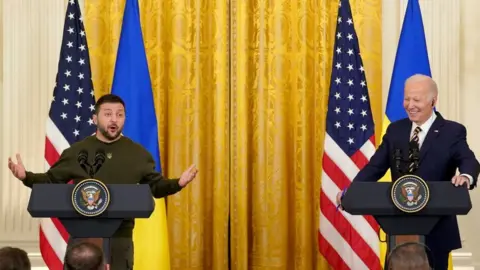Zelensky makes his pitch - will US sceptics buy it?

President Volodymyr Zelensky has been tethered to Ukrainian soil ever since Russia invaded his country nearly 10 months ago.
While he has given multiple speeches to foreign leaders and assemblies, they've all been via video conference, usually with the Ukrainian leader sitting in a nondescript, windowless room, clothed in his trademark olive-green military garb.
Now, Mr Zelensky has made his first trip abroad - to Washington - and while the attire was the same, the venue had all the regalia of American power.
In the run-up to war, Russia had tried to convince Ukrainians that the US was using their country as a geopolitical pawn - and that Americans would abandon them, as they did their Afghan allies.
Ten months and approximately $65bn in US aid later, US President Joe Biden and Mr Zelensky sat in the Oval Office, smiling and exchanging pleasantries, intent on proving those Russian insinuations had been - and would continue to be - false.
A show of unity
"This year has brought so much needless suffering and loss to the Ukrainian people," Mr Biden said at their joint press conference in the White House. "But I want you to know, President Zelensky, the American people are with you every step of the way. And we will stay with you."
They were powerful words, but they belie a reality that is more complicated.
US allies are facing a long, hard winter of high energy prices and accompanying economic pain. And American public support for US aid to Ukraine, while still high, has eroded since the early days of the war. A third of Americans in a recent survey said they do not back continued US aid to Ukraine. And half said they wanted Ukraine to settle for peace "as soon as possible".
With this high-profile meeting in Washington, Mr Zelensky and Mr Biden are seeking to demonstrate to the Ukrainian and American people, to Western allies, to Russian President Vladimir Putin and to the world - that US support for Ukraine is strong and durable.
 Reuters
ReutersThroughout their joint press conference, Mr Biden and Mr Zelensky tried to characterise American aid as serving a larger purpose. The American president described Russia's attack on Ukraine as an attack on "liberty and democracy and the core principles of sovereignty and territorial integrity" - one that demanded a robust American response.
Mr Zelensky, for his part, mixed gravitas and humour as he spoke with Mr Biden and to the American people. Occasionally switching into serviceable English to accentuate the connection with his audience, he called the US aid to Ukraine an "investment" that will strengthen global security.
It was an interesting choice of words - and one he repeated in his address to Congress. American aid was not "charity", but money spent with a purpose and a potential for future return.
A pitch to the sceptics
The future of the American "investment" in Ukraine, however, is not in Mr Biden's hands alone. And while the White House meeting was a pleasant photo opportunity, the real work for Mr Zelensky came in his address to Congress - to the legislators who hold the purse strings of American military and economic aid.
Over the course of this year, Congress has approved approximately $67bn in economic and military and economic assistance to Ukraine. A 2023 spending package Congress is poised to pass this week includes an additional $45bn in Ukraine aid.
Securing further aid in the new year, however, could be a challenge.
In May, 57 Republicans in the 435-seat House of Representatives and 11 in the 100-seat Senate voted against a stand-alone aid package, and polls indicate Republican support for continued assistance has eroded since then. In a survey conducted in November, just over half of Republican voters supported aid to Ukraine - down from 80% in March.
Some Republicans on the midterm election campaign trail last month openly wondered why the US was spending so much money on a distant country, instead of funding border security and fighting crime at home.
The midterms have brought in 86 new members of the House and seven new senators. Mr Zelensky's speech can also be viewed as an introduction to these new legislators and a pitch for their support. Coaxing further aid out of the House may prove the greater challenge - but in his speech to Congress he was willing to try.
"We have artillery. Is it enough? Not really," Mr Zelensky said, to some mutters from the congressional audience. "For the Russian army to completely pull out, more guns and shells are needed."
Prospective House Speaker Kevin McCarthy has already expressed concern about any further "blank cheques" for Ukraine. And there was public incredulity among some House Republicans in Congress when Republican Senate Minority leader Mitch McConnell said on Tuesday that Ukraine aid was the "number one priority" for his party.
Mr Zelensky, Donald Trump Jr tweeted on Wednesday, was "basically an ungrateful international welfare queen" - summing up what is becoming an increasingly prevalent view among the former president's "America first" supporters.
Mr Zelensky doesn't need further aid to Ukraine to be at the top of Republican's to-do list in the new year, but his trip to Washington is a high-profile effort to ensure that it doesn't drop off the agenda entirely.
